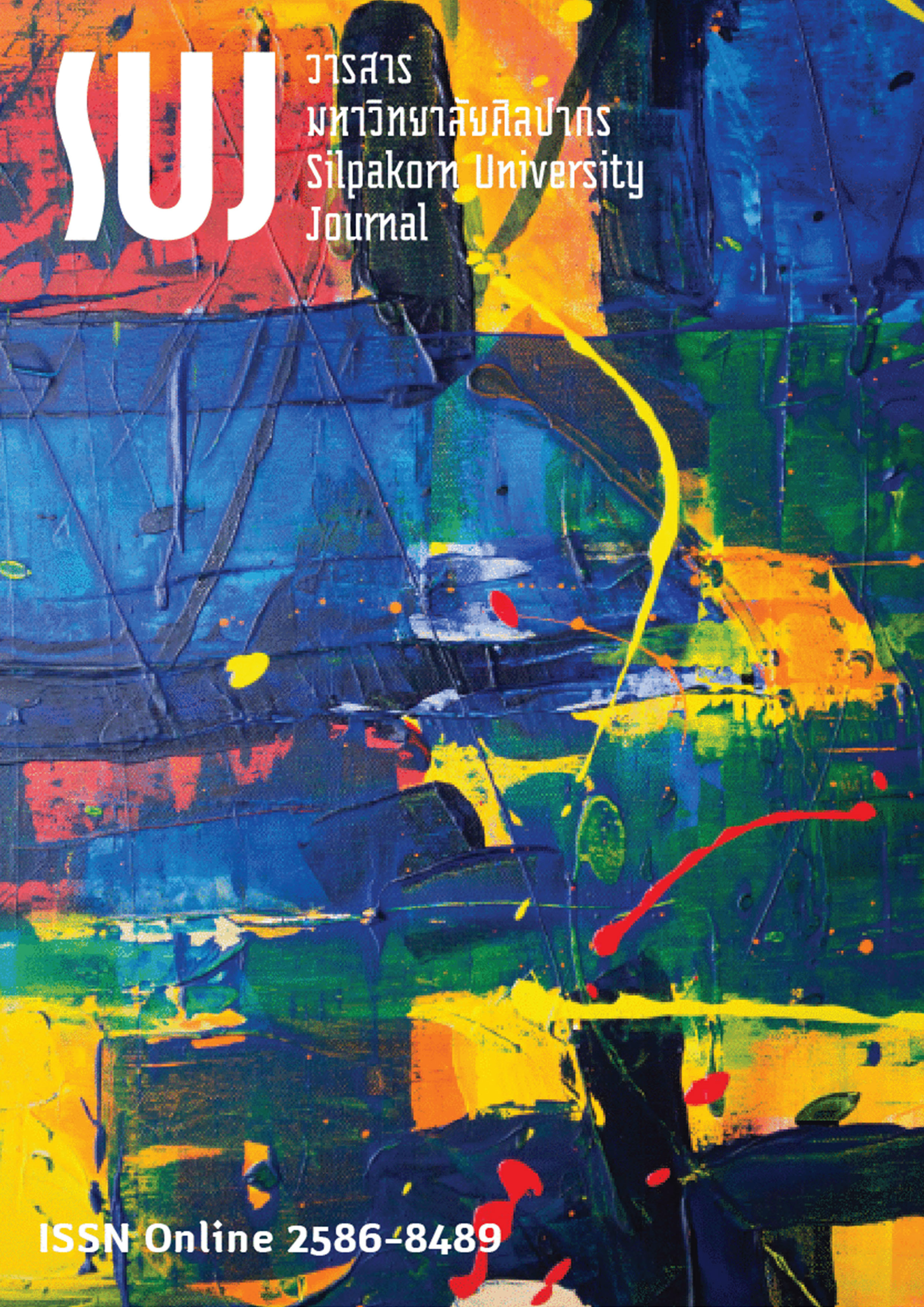Smart Pay และ Smart Guide : ต้นแบบการท่องเที่ยววิถีใหม่โดยใช้เทคโนโลยีแบบครบวงจร (Smart Pay and Smart Guide: A new normal tourism model using integrated technology)
Main Article Content
Abstract
การวิจัยครั้งนี้เป็นการวิจัยและพัฒนาเชิงทดลอง มีวัตถุประสงค์เพื่อออกแบบและพัฒนาแอปพลิเคชันระบบต้นแบบการจัดการท่องเที่ยวแบบครบวงจร กลุ่มตัวอย่างที่ให้ข้อมูล และกลุ่มเป้าหมายที่ใช้งาน ได้แก่ นักท่องเที่ยว และผู้ประกอบการ ด้านการท่องเที่ยว เครื่องมือที่ใช้ในการประเมิน คือ แบบสอบถาม และแบบสัมภาษณ์การใช้งานแอปพลิเคชัน วิเคราะห์ข้อมูลโดยการหาค่าเฉลี่ย และส่วนเบี่ยงเบนมาตรฐาน โดยผลการวิจัยสรุปได้ ดังนี้ 1) Smart Pay เป็นแอปพลิเคชันที่นักท่องเที่ยว ผู้ใช้งานสามารถซื้อสินค้าและบริการภายในสถานที่ท่องเที่ยวแบบไม่ใช้เงินสด ซึ่งผู้ประกอบการสามารถแก้ไขเนื้อหา โดยการเชื่อมต่อและเข้าถึงข้อมูลผ่านระบบการลงทะเบียน 2) Smart Guide เป็นแอปพลิเคชันที่มีการประยุกต์ใช้เทคโนโลยี Augmented Reality (AR) ร่วมกับเทคโนโลยี LiDAR sensor สำหรับนำเสนอการท่องเที่ยวแบบความเป็นจริงเสริม โดยผู้ประกอบการสามารถเปลี่ยนเนื้อหา (content) ได้ด้วยตนเอง 3) การประเมินผลการใช้งาน โดยภาพรวมมีประสิทธิภาพการใช้งานอยู่ในระดับดีมาก ทั้งนี้ ผู้เชี่ยวชาญมีความคิดเห็นว่า แอปพลิเคชันต้นแบบมีความทันสมัย มีความเหมาะสมที่จะนำมาใช้ในด้านการท่องเที่ยวเพื่ออำนวยความสะดวก และกระตุ้นความน่าสนใจแก่นักท่องเที่ยวในยุคดิจิทัล มีค่าเฉลี่ย (X̅) เท่ากับ 4.82 (S.D. = 0.48) ในส่วนของนักท่องเที่ยวมีความคิดเห็นว่า การใช้งาน Smart Guide ฟีเจอร์ต่าง ๆ สามารถกระตุ้นความสนใจให้นักท่องเที่ยวอยากไปยังสถานที่ต่าง ๆ ในแหล่งท่องเที่ยว มีค่าเฉลี่ย (X̅) เท่ากับ 4.68 (S.D. = 0.87) ผู้ประกอบการมีความเห็นว่า ภาพรวมการใช้งานระบบต้นแบบดิจิทัลอัจฉริยะสำหรับการท่องเที่ยว ผ่านเทคโนโลยีสมัยใหม่แบบครบวงจร มีคุณภาพการใช้งานอยู่ในระดับดีมาก ทั้งนี้ รูปแบบการนำเสนอด้วยเทคโนโลยี AR ร่วมกับเทคโนโลยี LiDAR มีความน่าสนใจ และใช้งานได้ง่าย
This research is experimental research and development which aims to design and develop a comprehensive tourism management model application. The key informants and target groups are tourists and tourism operators. The assessment tools were questionnaires and interviews. The data were analyzed by mean and standard deviation. The results can be summarized as follows: 1) Smart Pay is an application that allows users to purchase goods and services within the tourist area without cash. Entrepreneurs can edit the content by connecting and accessing information through the registration system. 2) Smart Guide is an application that integrates Augmented Reality technology (AR) with LiDAR sensor technology to present an augmented reality tour. The operator can change the content by themselves. 3) The overall evaluation of the prototype application efficiency by the experts is at a very good level. The model application is modern and suitable to be used in tourism to facilitate and attract tourists in the digital era with an average (X̅) of 4.82 (S.D. = 0.48). According to the tourists, the use of various Smart Guide features can arouse their interest to visit places in tourist attractions, with an average (X̅) of 4.68 (S.D. = 0.87). In the entrepreneurs’ opinion, the quality of intelligent digital prototype usage for tourism is at a very good level. In addition, the presentation model with AR technology combined with LiDAR technology is interesting and easy to use.
Downloads
Article Details

This work is licensed under a Creative Commons Attribution-NonCommercial-NoDerivatives 4.0 International License.
References
Basili, A., Liguori, W., & Palumbo, F. (2014). NFC smart tourist card: Combining mobile and contactless technologies towards a smart tourist experience. In S. M. Reddy (Ed.), Proceedings of 2014 IEEE 23rd International WETICE Conference, (pp. 249-254). New Jersey: IEEE Computer Society’s Conference Publishing Services (CPS).
Compliu, Apichart, Chalermsuk, Chanintorn, & Chuamsombat, Kriengsak. (2018). Development of Thailand tourism application using virtual reality technology (การพัฒนาแอพพลิเคชันแนะนำสถานที่ท่องเที่ยวในประเทศไทยด้วยเทคโนโลยีความเป็นจริงเสมือน). In Proceedings of 2nd UTCC Academic Day National Conference, (pp. 1873-1885). Bangkok: University of the Thai Chamber of Commerce.
Egger, R., & Buhalis, D. (2008). eTourism Case Studies: Management and Marketing Issues. Oxford: Butterworth-Heinemann.
Glover, J., & Linowes, J. (2019). Complete Virtual Reality and Augmented Reality Development with Unity. Birmingham: Packt.
Harfield, A. (2019). Application Sukhothai Adventure. [Online]. Retrieved January 24, 2021 from http://164.115.28.46/thaiexen/search_detail/result/309
Kanchanawong, Paisarn, & Siri, Raktida. (2018). Behavior analysis of information and communication technology usage of Chinese tourists in Chiang Mai, Thailand (พฤติกรรมการใช้เทคโนโลยีสารสนเทศและการสื่อสารทางการท่องเที่ยวของนักท่องเที่ยวชาวจีนที่เดินทางมาเที่ยวในจังหวัดเชียงใหม่). Journal of Yala Rajabhat University, 13(1): 101-113.
Kaosa-ard, Mingsarn. (2020). The direction of Thai tourism after the COVID-19 crisis (ทิศทางท่องเที่ยวไทย หลังวิกฤตโควิด-19). In A. Wongbenjarat, & C. Pitanupong (Eds.), Tourism Economic Review: COVID-19 and the Impact on Thai Tourism, The Country’s Tourism Situation in the First Quarter of 2020 (รายงานภาวะเศรษฐกิจการท่องเที่ยว: COVID-19 กับผลกระทบต่อการท่องเที่ยวไทยสถานการณ์การท่องที่ยวของประเทศ ไตรมาส 1/2563), (pp. 42-53). Bangkok: Office of the Permanent Secretary of Ministry of Tourism and Sports.
Lanham, M. (2018). Learn ARCore - Fundamentals of Google ARCore: Learn to Build Augmented Reality Apps for Android, Unity, and the Web with Google ARCore 1.0. Birmingham: Packt.
Nutmos. (2017). Google Launches ARCore, Augmented Reality Development Kit for Android (Google เปิดตัว ARCore ชุดพัฒนา augmented reality บน Android). [Online]. Retrieved November 25, 2020 from https://www.blognone.com/node/95099
Poonlaptawee, Kanda. (1996). Statistics for Research (สถิติเพื่อการวิจัย). Bangkok: Physics Center.
Royal Society. (2020). New Normal (นิวนอร์มัล). [Online]. Retrieved December 1, 2021 from https://royalsociety.go.th/tag/new-normal/
Suksa-Ngiam, Watanyoo. (2020). What is a Digital Platform ? (แพลตฟอร์มดิจิทัลคืออะไร?). [Online]. Retrieved December 1, 2020 from https://medium.com/@watanyoo.suksangiam/แพลตฟอร์มดิจิทัลคืออะไร-cb8d455b23c
Thai Health Promotion Foundation. (2020). New Normal Tourism of Responsibly (ท่องเที่ยววิถีใหม่ อย่างรับผิดชอบ). [Online]. Retrieved January 24, 2022 from https://www.thaihealth.or.th/?p=234637
Uwamariya, M., Cremer, S., & Loebbecke, C. (2021). Mobile payment enhancing tourism in emerging markets: A qualitative study among small and medium-sized enterprises (SMEs) in Rwanda’s tourism sector. Journal of African Business, 23(2): 480-496.
Zhang, Y., Sotiriadis, M., & Shen, S. (2022). Investigating the impact of smart tourism technologies on tourists’ experiences. Sustainability, 14(5): 3048.


